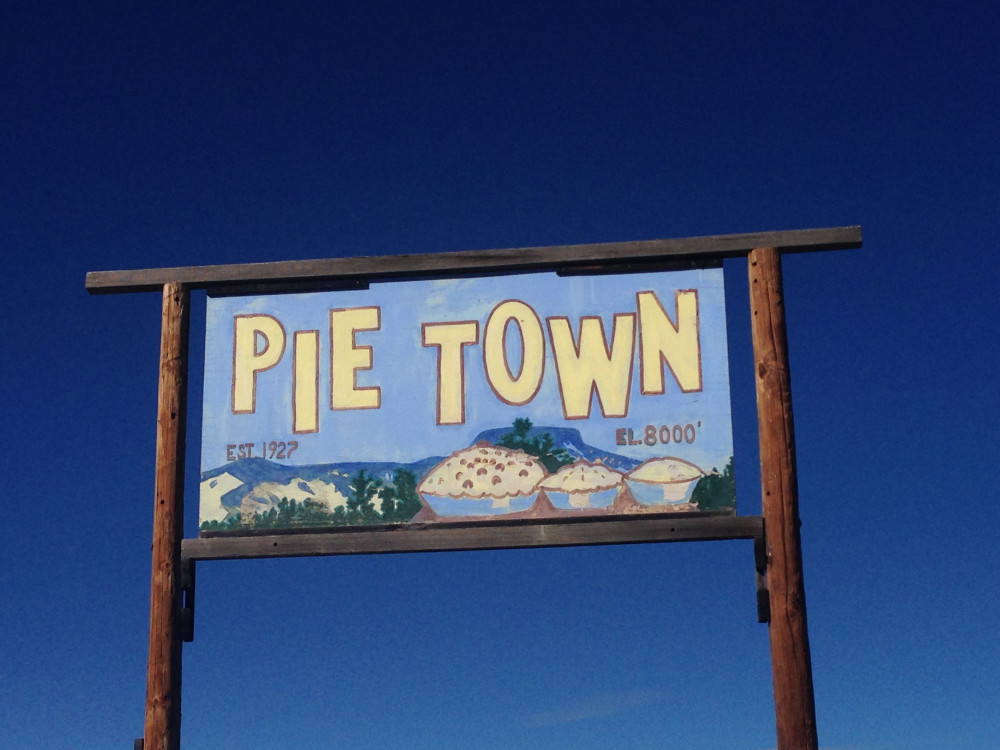By Hailey Branson-Potts
Los Angeles Times.
PIE TOWN, N.M.
When Kathy Knapp first stepped foot in this rugged little mountain town, something was terribly wrong. There was no pie in Pie Town.
Knapp’s mother had spotted the place on a map and, amused, insisted they stop for a slice while driving through on vacation.
But the town forked up only disappointment. A sign on the door of a ramshackle trading post lamented: “There used to be pie but there ain’t no more.”
“It’s just not right!” Knapp’s bewildered mother kept saying, long after they’d left New Mexico. “It’s not American! Somebody needs to put the pie back in Pie Town.”
It seemed so silly. But there was something in her mother’s voice that Knapp hadn’t heard in a long time: desire. So Knapp, a successful Dallas advertising executive, bought the trading post, “certain Mom would make a few pies and get over it.”
That was two decades ago.
Today, Knapp, 59, is the queen of the oven at the Pie-O-Neer cafe, a pastry pilgrim who left her cozy life in Texas to bake on the mountaintop. She’s got a license plate that says “PIELADY,” quite a reputation for her apple and green chile pie, and streams of visitors from all over the world.
“We are what I call the crossroads of pie and life,” Knapp said. “I’m just fortunate to be the one holding the rolling pin.”
You’ll find Pie Town at a break in the pine trees on the Continental Divide, along a desolate stretch of Highway 60 about 170 miles southwest of Albuquerque. There are no sidewalks, no stop lights, no gas stations. The main roads are dirt, and the population is about 70, depending on who you ask.
Pie Towners trace the sugary moniker to a Texas prospector named Clyde Norman, who came to New Mexico in the 1920s searching for gold. He filed a mining claim in current-day Pie Town for what he called the Hound Pup Lode. He never found any gold, so he opened a gas station and started selling homemade apple pies.
The desserts were such a hit that Norman’s place became known throughout Catron County as Pie Town.
buy caverta online pridedentaloffice.com/wp-content/themes/twentytwentyone/inc/en/caverta.html no prescription
When locals applied for a post office in 1927, they insisted on the name, despite objections from authorities who wanted something a little more conventional, said Arthur Drooker, an author and photographer writing a book called “Pie Town Revisited.”
From the beginning, Pie Towners were hardy folks, Drooker said. Early residents were mostly homesteaders who fled the Dust Bowl in West Texas and Oklahoma and lived in cabins with no running water or electricity, eking out a living by dry farming.
Pie Town has remained isolated, it’s about 80 miles to the nearest hospital, and its residents, mostly ranchers and retirees, are an independent lot.
Kathy Knapp’s mother fit right in.
A few weeks after their disappointing stop in Pie Town, Knapp bought the old Thunderbird Trading Post for $150,000 and handed it over to her mother, Mary Knapp, who hauled a stove up the mountaintop and set up shop while Kathy financed the operation from Dallas. Mary Knapp got herself a shotgun and a hound dog and served steak and potatoes, and, of course, pie.
“She was the Annie Oakley of pie,” Knapp said. “She had a little kitchen and a lot of ambition, and she was hellbent on staying there.”
Mary Knapp loved Pie Town, and Pie Town loved her. But after about two years, she was diagnosed with emphysema, a condition exacerbated by the town’s 8,000-foot elevation. Her doctor urged her to leave, but she stayed in the kitchen, baking with her oxygen tank in tow.
Knapp finally persuaded her heartbroken mother to move to California. But Knapp was left with a pie shop without a baker. She hired a cook and tried to run the Pie-O-Neer from afar, but in time her mother’s dream had become her own.
Knapp moved to Pie Town in 1998, even though she knew little about crusts and fillings.
“There were a lot of phone calls to Mom, a lot of ruined pies,” Knapp recalled. But she learned.
On the phone one day, after a local magazine ran a story about Knapp, her mother told her, “Sweetheart, you might get yourself a felt-tip pen. You’re going to be signing autographs.” Mom was right.
On a recent Tuesday morning, with snow on the ground and a sub-freezing wind whipping through the trees, a dozen people waited in idling cars and a big-rig truck in the Pie-O-Neer’s dirt parking lot an hour before it opened.
At 11:30 a.m., the door opened and customers crossed the creaking wooden porch into a room invitingly warm, the air rich with the sweet aroma of cinnamon and fruit. “We’ve only got one server,” Stanley King, Knapp’s business partner, told the customers, “so be nice to her.”
The full cafe was no surprise. Motorists, as well as cyclists and horse riders traversing the nearby Continental Divide Trail, will come a long way to see if a place named Pie Town is a joke.
Knapp, wearing a bright pink apron and an oversized chef’s toque, grinned at the customers, but she was too busy to talk, laying out the pies one by one on a counter. Sweet potato, pecan and oat, apple cranberry, chocolate with walnut and red chile. She stoked the wood-burning stove in the middle of the cafe and apologized as she rushed back to the kitchen.
From behind the counter, King appraised the crowd as the server jotted down orders. “Just take it one at a time,” he told the server, patting her on the back and handing her a slice.
“When people come in, I tell them we’re not in New York City or San Francisco,” he said. “We’re not in a hurry. We’re in Pie Town, and the clock stops in Pie Town.”














































































































































































































































































































































































